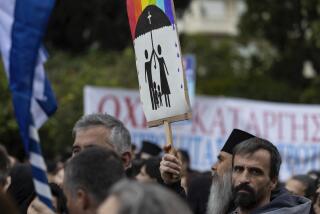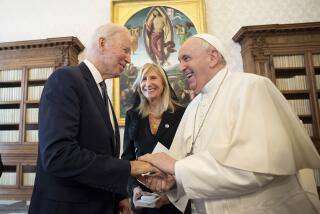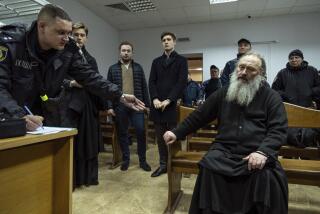Orthodox Angry at Vatican’s Plans for Dioceses in Russia
- Share via
MOSCOW — The Vatican announced Monday that it will establish four formal dioceses within Russia, touching a theological nerve and sparking a round of condemnations from the Russian Orthodox Church, which accused the Roman Catholics of violating its “canonical territory.”
The decision may prompt a temporary freeze in relations between the two churches, said Metropolitan Kirill, chairman of the Russian Orthodox Church’s external relations commission.
He said it was “absolutely clear that the decision has dealt a blow to the improvement of the relationships between our churches that had just started to take shape.”
Catholic emissaries had privately informed the Orthodox patriarchy of the plan Friday, but the decision to form dioceses in place of “apostolic administrations” established by the church during Soviet times was formally announced Monday.
At the Vatican, church spokesman Joaquin Navarro-Valls said the move was prompted by “the need to improve the pastoral assistance to the Catholics present in that vast region, as they have insistently requested.”
“Today’s decision of the Holy See to raise the apostolic administrations [in Russia] to the level of proper dioceses is just bringing the structure of the Catholic Church in Russia back to normal. Nothing else,” said Archbishop Tadeusz Kondrusiewicz, the Catholic apostolic administrator in Moscow.
An Infringement of the Orthodox View
An estimated 1.3 million Catholics live in Russia, according to the Vatican, but Kondrusiewicz put the figure at about 500,000 within Russia’s population of 144 million.
Most Catholics in Russia are of German, Polish, Lithuanian or Belarussian descent; some in Siberia descended from political exiles in czarist and Soviet times. A smattering of foreign Catholics, including Filipinos, Koreans and Africans, work or study in Russia.
But for the Orthodox hierarchy, the establishment of dioceses is an infringement of its view of Russia as its own “canonical territory.” From the Orthodox perspective, there cannot be dual spiritual authorities in a given place.
“If in the past there was only some moderate presence of the Catholic Church in Russia, then starting today there in fact is an alternative church here, a new church,” said Archpriest Vsevolod Chaplin, an Orthodox spokesman. “Our attitude toward this move is exactly the same as the Catholics would have to us appointing an alternative pope of Rome.”
Kondrusiewicz pointed out that the Vatican has been amenable to Orthodox dioceses being established in predominantly Catholic countries.
“Take Poland, for instance,” he said. “I cannot say exactly how many [Orthodox] dioceses there are now today, but there are about half a dozen.”
Even though only about 200 Catholic parishes are scattered across Russia, compared with well over 10,000 Orthodox communities, the Orthodox fear that the Catholic Church intends to recruit new members.
A range of sharp disagreements between the two churches has prevented Pope John Paul II, 81 and ailing, from fulfilling an often expressed wish to pay an ecumenical visit to Russia during his papacy. The Russian Orthodox patriarch, Alexy II, has refused to issue an invitation and protested last year when John Paul dared to visit Ukraine and Kazakhstan without the Orthodox church’s consent.
President Vladimir V. Putin said last month that he would host the pope if the Vatican and the Russian Orthodox Church ever managed to resolve their disputes, but Orthodox leaders say that is increasingly unlikely.
Historical Distrust Seen as One Root of the Rift
Geraldine Fagan, a correspondent in Moscow for the Britain-based Keston Institute, which monitors religious freedom in the former Soviet Union, said the two churches’ rift is fraught with historical distrust.
For one thing, she said, the Russian Orthodox Church considers all Russians part of its flock, whether or not they espouse a belief in God or attend church regularly. Any contact between Russians and the Catholic Church, therefore, is considered proselytism.
Another friction has been the rapid resurgence of the Catholic Church in Ukraine. Since the fall of communism 10 years ago, the Eastern-rite, Greco-Catholic Church has been reclaiming believers, churches and property that had fallen into the hands of the pro-Moscow Orthodox church in western Ukraine after that region came under Soviet control during World War II. To the Catholics, it is a correction of a historical injustice; to the Russian patriarch, it amounts to Catholic expansion.
Decision Seen as One More Insult
A religious affairs expert with the patriarch’s publishing house said that, for the Orthodox, Monday’s announcement was one more insult by the West against Russia.
“The way the Catholic Church acted falls in line with the traditionally harsh policies of the Vatican toward the Russian Orthodox,” said the expert, who asked not to be identified.
The animosities reach back centuries, Fagan said.
“It sounds almost ridiculous, but if you talk to those Russian Orthodox who are virulently anti-Catholic, if you ask them why, within a couple of minutes they will be telling you about the Crusades of 1204. They are not looking at today, at the modern world--they immediately go back to the Middle Ages.”
*
Alexei V. Kuznetsov of The Times’ Moscow Bureau contributed to this report.
More to Read
Sign up for Essential California
The most important California stories and recommendations in your inbox every morning.
You may occasionally receive promotional content from the Los Angeles Times.













